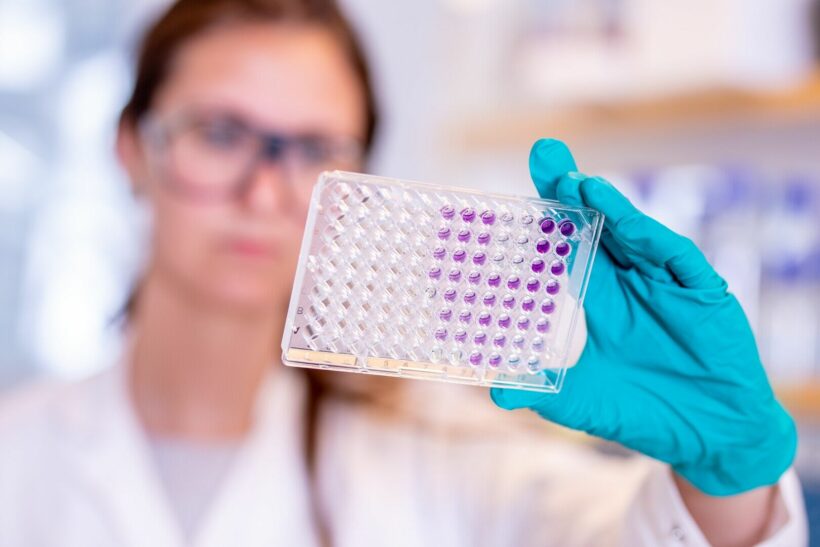Clinical trials confirm AstraZeneca’s Covid-19 vaccine is safe and effective

The following is a news release from biopharmaceutical company AstraZeneca. Thailand secured 61 million doses of the Covid-19 vaccine produced by AstraZeneca, developed in partnership with Oxford University. With European Union’s newly-imposed restrictions on Covid-19 vaccine exports, AstraZeneca will now send a batch of 150,000 doses of its vaccine to Thailand from a factory in Asia, rather than from Italy like initially planned.
The primary analysis of the Phase III clinical trials from the UK, Brazil and South Africa, published as a preprint in The Lancet confirmed COVID-19 Vaccine AstraZeneca is safe and effective at preventing COVID-19, with no severe cases and no hospitalisations, more than 22 days after the first dose.
Results demonstrated vaccine efficacy of 76% (CI: 59% to 86%) after the first dose, with protection maintained to the second dose. With an inter-dose interval of 12 weeks or more, vaccine efficacy increased to 82% (CI: 63%, 92%).
The analysis also showed the potential for the vaccine to reduce asymptomatic transmission of the virus, based on weekly swabs obtained from volunteers in the UK trial. The data showed that PCR positive readings were reduced by 67% (CI: 49%, 78%) after a single dose, and 50% (CI: 38% to 59%) after the two dose regimen, supporting a substantial impact on transmission of the virus.
The primary analysis for efficacy was based on 17,177 participants accruing 332 symptomatic cases from the Phase III UK (COV002), Brazil (COV003) and South Africa (COV005) trials led by Oxford University and AstraZeneca, a further 201 cases than previously reported.
Sir Mene Pangalos, Executive Vice President BioPharmaceuticals R&D, said: “This primary analysis reconfirms that our vaccine prevents severe disease and keeps people out of hospital. In addition, extending the dosing interval not only boosts the vaccine’s efficacy, but also enables more people to be vaccinated upfront. Together with the new findings on reduced transmission, we believe this vaccine will have a real impact on the pandemic.”
Professor Andrew Pollard, Chief Investigator of the Oxford Vaccine Trial, and co-author of the paper, said: “These new data provide an important verification of the interim data that has helped regulators such as the MHRA in the UK and elsewhere around the world to grant the vaccine emergency use authorisation. It also helps to support the policy recommendation made by the Joint Committee on Vaccination and Immunisation for a 12-week prime-boost interval, as they look for the optimal approach to roll out, and reassures us that people are protected 22 days after a single dose of the vaccine.”
Data will continue to be analysed and shared with regulators around the world to support their ongoing rolling reviews for emergency supply or conditional approval during the health crisis. AstraZeneca is also seeking Emergency Use Listing from the World Health Organization for an accelerated pathway to vaccine availability in low-income countries.
The vaccine can be stored, transported and handled at normal refrigerated conditions (two-eight degrees Celsius/36-46 degrees Fahrenheit) for at least six months and administered within existing healthcare settings.
AstraZeneca continues to engage with governments, international organisations and collaborators around the world to ensure broad and equitable access to the vaccine at no profit for the duration of the pandemic.
COV002
COV002 is a single-blinded, multi-centre, randomised, controlled Phase II/III trial assessing the safety, efficacy and immunogenicity of AZD1222 in 12,390 participants in the UK. Trial participants to date are aged 18 years or over, who are healthy or have medically stable chronic diseases and are at increased risk for being exposed to the SARS-CoV-2 virus. Participants receive one or two intramuscular doses of a half dose (~2.5 x1010 viral particles) or full dose (~5×1010 viral particles) of AZD1222 or comparator, meningococcal vaccine MenACWY. Participants have blood samples drawn and clinical assessments for safety as well as immunogenicity at multiple timepoints up to one year post-vaccination. Suspected cases presenting with compatible symptoms were tested for virological confirmation by COVID-19 PCR. In addition, weekly swabbing is done for detection of infection and assessment of vaccine efficacy against infection.
COV003
COV003 is a single-blinded, multi-centre, randomised, controlled Phase III trial assessing the safety, efficacy, and immunogenicity of AZD1222 in 10,300 participants in Brazil. Trial participants to date are aged 18 years or over, who are healthy or have medically stable chronic diseases and are at increased risk for being exposed to the SARS-CoV-2 virus. Participants are randomised to receive two intramuscular doses of a full dose (~5×1010 viral particles) of AZD1222 or comparator, meningococcal vaccine MenACWY as first dose and a saline placebo as second dose. Participants have blood samples drawn and clinical assessments for safety as well as immunogenicity at multiple timepoints up to one year post-vaccination. Suspected cases presenting with compatible symptoms were tested for virological confirmation by COVID-19 PCR.
COV005
COV005 is a blinded, multi-centre, randomised, controlled Phase I/II trial assessing the safety, efficacy, and immunogenicity of AZD1222 in 2,070 participants in South Africa. Trial participants are aged 18-65 years, who are living with or without HIV, are randomised to receive two intramuscular doses of AZD1222 at 5-7.5 x1010 viral particles or saline placebo. Participants had blood samples drawn and clinical assessments for safety as well as immunogenicity at multiple timepoints up to one year post-vaccination. Regular COVID-19 PCR testing is performed up to one year post-vaccination.
COVID-19 Vaccine AstraZeneca, formerly AZD1222
COVID-19 Vaccine AstraZeneca was co-invented by the University of Oxford and its spin-out company, Vaccitech. It uses a replication-deficient chimpanzee viral vector based on a weakened version of a common cold virus (adenovirus) that causes infections in chimpanzees and contains the genetic material of the SARS-CoV-2 virus spike protein. After vaccination, the surface spike protein is produced, priming the immune system to attack the SARS-CoV-2 virus if it later infects the body.
In addition to the programme led by Oxford University, AstraZeneca is conducting a large trial in the US and globally. In total, Oxford University and AstraZeneca expect to enrol up to 60,000 participants globally.
The AstraZeneca COVID-19 vaccine has already been granted conditional marketing authorisation or emergency use in close to 50 countries, spanning four continents including in the EU, a number of Latin American countries, India, Morocco and the UK.
Latest Thailand News
Follow The Thaiger on Google News:


























